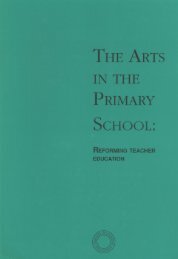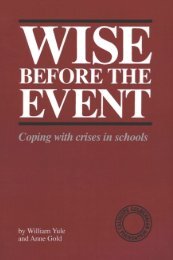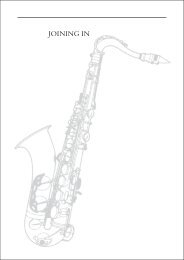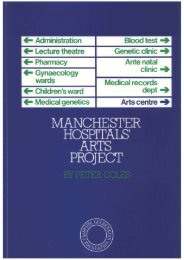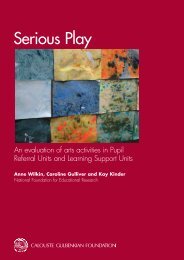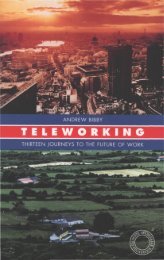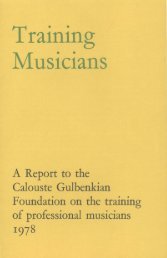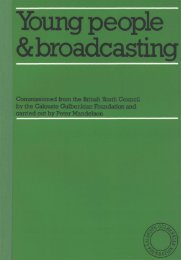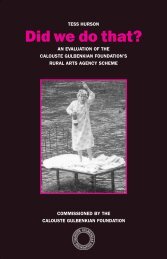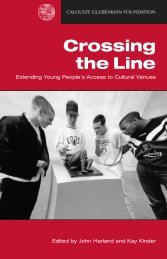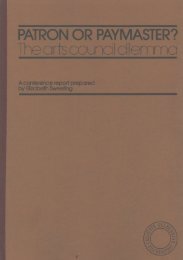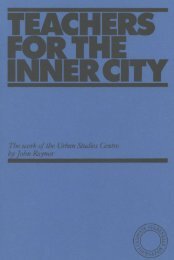The Arts in Schools - Calouste Gulbenkian Foundation
The Arts in Schools - Calouste Gulbenkian Foundation
The Arts in Schools - Calouste Gulbenkian Foundation
- No tags were found...
You also want an ePaper? Increase the reach of your titles
YUMPU automatically turns print PDFs into web optimized ePapers that Google loves.
politicians on all sides were compet<strong>in</strong>g to say who thought of the idea first.By 1987 the value of a national curriculum was almost taken for granted. <strong>The</strong>issue was, and rema<strong>in</strong>s, 'What sort of national curriculum?'From the po<strong>in</strong>t of view of this report, a national curriculum is greatly to bewelcomed. <strong>The</strong> actual provisions for the arts <strong>in</strong> the Education Reform Act are<strong>in</strong>appropriate and must be challenged. But it would be wrong to suppose agolden age for arts education existed before 1988, which the NationalCurriculum has now swept away. Our reason for publish<strong>in</strong>g the report <strong>in</strong> thefirst place was that the arts were historically undervalued and poorly providedfor <strong>in</strong> state schools. Our aim was and is to secure a full and balanced artseducation for all pupils as a matter of basic educational entitlement. This isbest done with<strong>in</strong> an agreed statutory framework <strong>in</strong> all schools. <strong>The</strong> newdifficulty is that the particular provisions of the Education Reform Act forthe arts do not go far enough, and <strong>in</strong> one respect at least are badly misconceived.<strong>The</strong> legislation identifies mathematics, English and science as core subjectsand art and music as two of the other seven foundation subjects. <strong>The</strong> <strong>in</strong>clusionof art and music with<strong>in</strong> the National Curriculum is very important and mayprove to enhance the place of all the arts <strong>in</strong> schools. In terms of the argumentspresented <strong>in</strong> this report, however, there is no reason to elevate these two areasof the arts above others, notably dance and drama. M<strong>in</strong>isters have been keento argue that drama is <strong>in</strong>cluded <strong>in</strong> the National Curriculum with<strong>in</strong> English,and dance as part of PE. This argument betrays a basic misapprehension ofthe nature and relationships of the arts <strong>in</strong> schools. Be<strong>in</strong>g aware of this, theNational Curriculum work<strong>in</strong>g group on English, under the chairmanship ofProfessor Brian Cox, concluded that 'the <strong>in</strong>clusion of drama methods <strong>in</strong>English should not <strong>in</strong> any way replace drama as a subject for specialist study'(DES 1989 Para 8.3).As we argue throughput this report, music, dance, drama, visual arts andverbal arts share similar processes and fulfil related roles <strong>in</strong> education andshould be planned for collectively as a generic area of the curriculum. <strong>The</strong>division of art and music from other arts discipl<strong>in</strong>es and the <strong>in</strong>clusion ofdrama and dance as aspects of English and PE is as <strong>in</strong>appropriate as a divisionbetween, say, chemistry and biology from the rest of science, and the <strong>in</strong>clusionof physics under maths. This is feasible, but misconceived.Sensibly, the National Curriculum identifies 'science' as a generic area of thecurriculum. <strong>The</strong> Secretary of State commissioned a specialist work<strong>in</strong>g groupto identify <strong>in</strong> detail the range and depth of science education appropriate toall pupils, draw<strong>in</strong>g on the varied knowledge and expertise of the variousscientific discipl<strong>in</strong>es (DES 1988). A similar approach is needed <strong>in</strong> the arts andachiev<strong>in</strong>g it is an urgent task. <strong>The</strong> National Curriculum is not set <strong>in</strong> stone.One of the tasks of the NCC is to keep the curriculum under review and toadvise the Secretary of State on proper revisions. A medium-term objectivemust be to ensure a more coherent provision for the arts with<strong>in</strong> an equal andcommon framework for all discipl<strong>in</strong>es.XV



